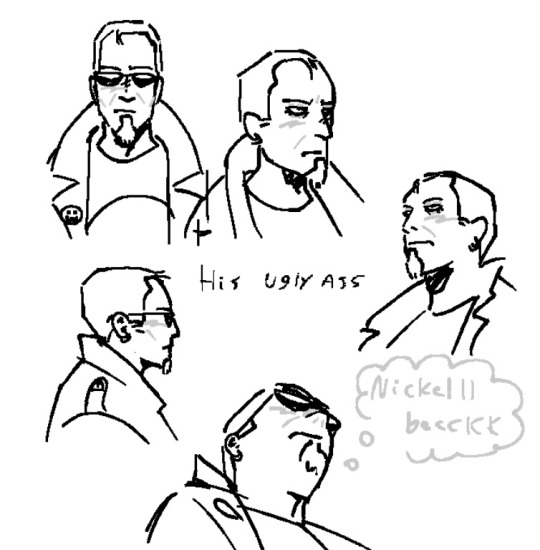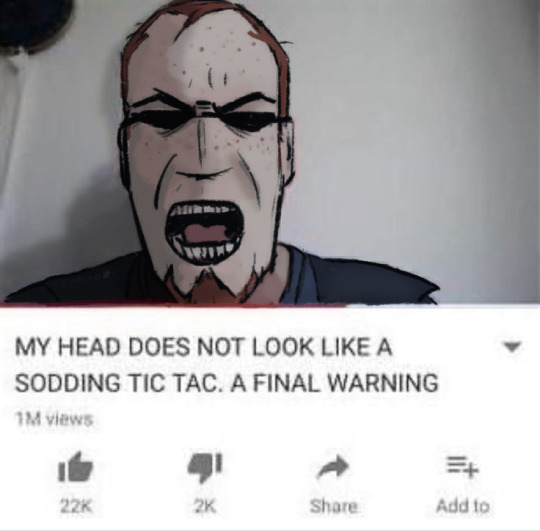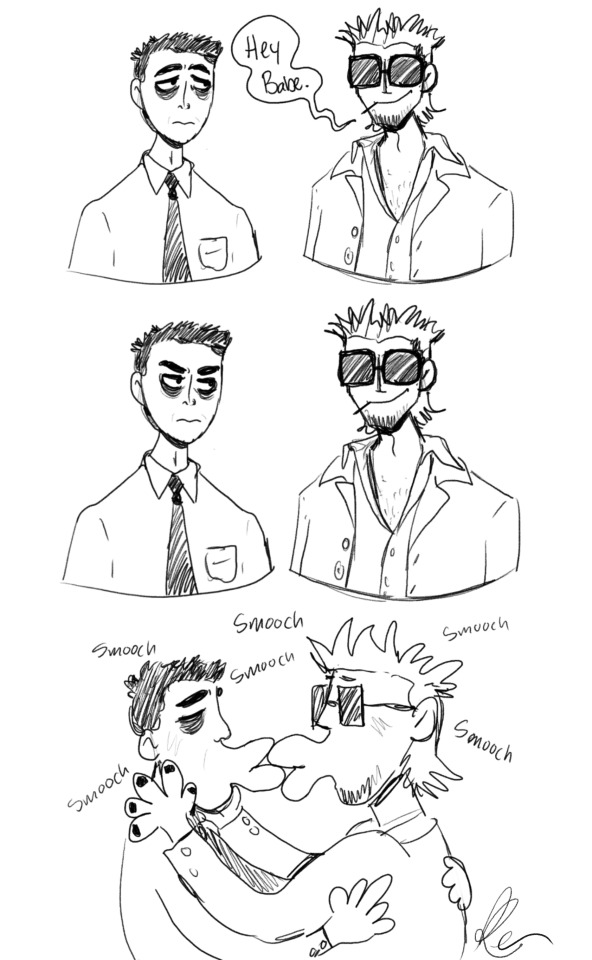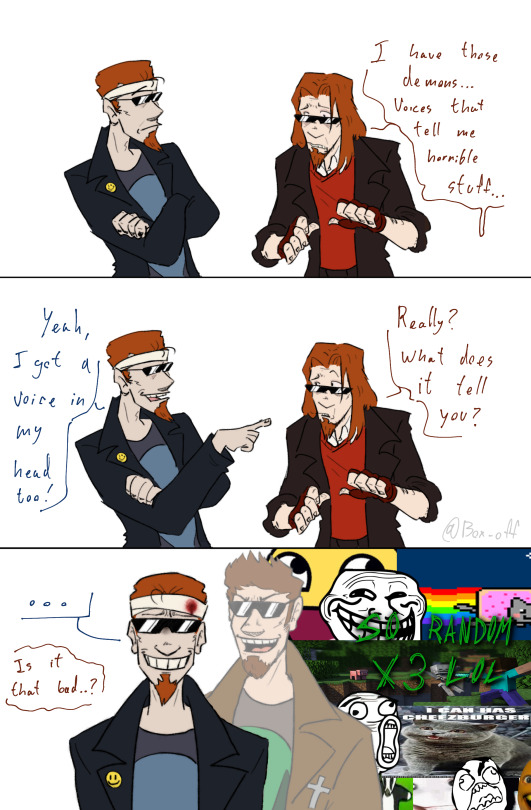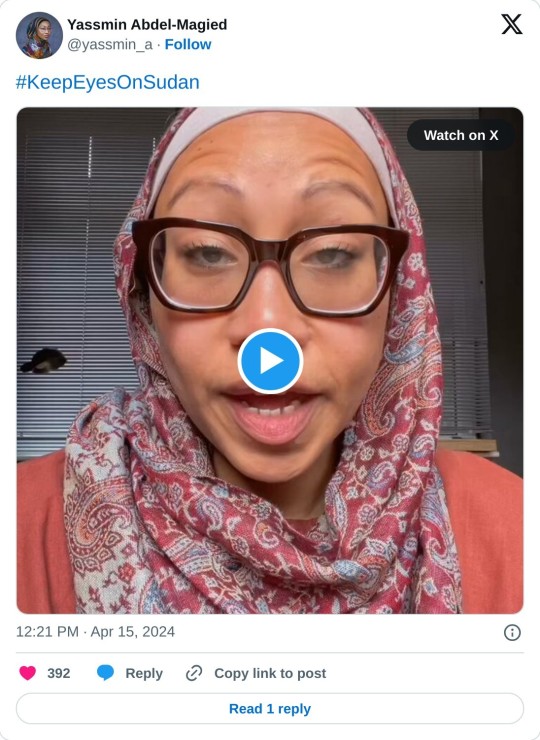Note
Over 100 anti Israeli posts but not a single one condemning Hamas 🤔
That's because I don't. Hope that clears things up for you
9K notes
·
View notes
Text
Postal 1 dude isn't evil (and is genuinely the most morally grounded and decent person we've actually met in the Postal Universe)
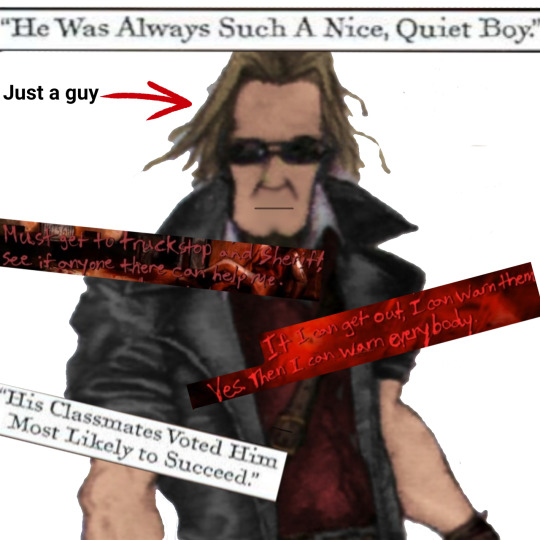
From what we gather he was living a very normal life prior to going crazy, not like the other dudes who go on senseless rampages when tasked with mundane everyday things. As Promo material does state he's a well educated and mannered person so it's only realistic that this man did have a genuine job and was generating a level of income prior to his decline in mental health and moving to Paradise.
And as stated before he is well mannered in the sense of being stated a "quiet nice boy" and "voted the most likely to succeed". From what we gather this guy was the text book example of a model citizen. The only "flaw" is that he kept referring to a girl he only dated once as his girlfriend but even then that could come down his delusions along with his lack of grip on reality causing him to genuinely think she's his girlfriend or the fact he's canonically quiet (as shown from the Promo material and also the fact that he doesn't actually physically speak AT ALL during the game) and most likely doesn't understand social ques as of it.
---------------------------------------
But the most important thing is that he doesn't even have malicious intentions.
The very first thing he proposes after being "attacked" by "groups of lunatics trying to invade his home" is.....go the sherrif for help. The Dude didn't have any Intention to go on a murder spree, he'd rather of just went to the authorities like any other average Joe. The whole thing really tells us that he's not usually a violent person.
Even rewinding back to level one: the war journals (and Vince) did state that the Dude was entirely convinced that he was being attacked by group of lunatics, one of which even firing rockets at him, goes without saying that self defence is really the only option here.
Course it remains solely as self defence until the Dude reaches the train station, the significance being his war journal where he writes "if I can get out i can warn everybody...YES, I CAN WARN EVERYBODY!". The dudes goal has shifted into saving the country as a whole rather than himself which ultimately steers him into going to the air force to find out what has happened to cause the supposed hate plague. The dudes actions represent him more as selfless now with him now doing this in the bigger scheme of things rather than his own self preservation. If its not clear already: maniacs wouldn't care about warning/ saving people from a hate plague, Dude 2 most likely wouldn't give a shit and let it spread since he was totally cool with nuking the entirety of paradise and its innocent civilians.
Furthermore he openly states that he doesn't want to kill people. At the trailer park he writes that "There must be others like me, immune to this...germ warfare or whatever it is". Practically he's saying that he'd much rather run into some normal people instead of having to kill them, it's a stark contrast to the other dudes with the Postal 1 dude appearing as genuinely empathetic whereas the others will literally kill people for something as simple as waiting in line and afterwards not think anything of it.
Also very worth noting that when he enters the ghetto he mentions he's genuinely worried he'll get mugged, we're really getting the picture that he's literally just some normal ass guy with the idea of going to the rough side of town shakes him up.
(Even worth pointing out that only for the ghetto does he go back to calling it a diary like he's momentarily lost his soldier/war mentality at the thought of going into the rough side of town).
---------------------------------------
So simple and short:
Postal 1 dudes literally just some average everyday guy (who's been through some really fucked up shit that's forever gonna remain unexplained beyond the veteran theory) who's trying to do the right thing but he's woefully misguided due to his deteriorating mental state as well as being possessed by an entity beyond his broken minds comprehension.
He's literally the complete opposite to every other postal dude (and if anything he's one of the most morally grounded people in the franchise as crazy as it is)
Oh and if this wasn't enough: rws did say on a twitter post that he's literally Just some average guy who's had some shitty days.
(I wrote this at 4am so soz if it's all over the place)
206 notes
·
View notes
Text


1 note
·
View note
Text

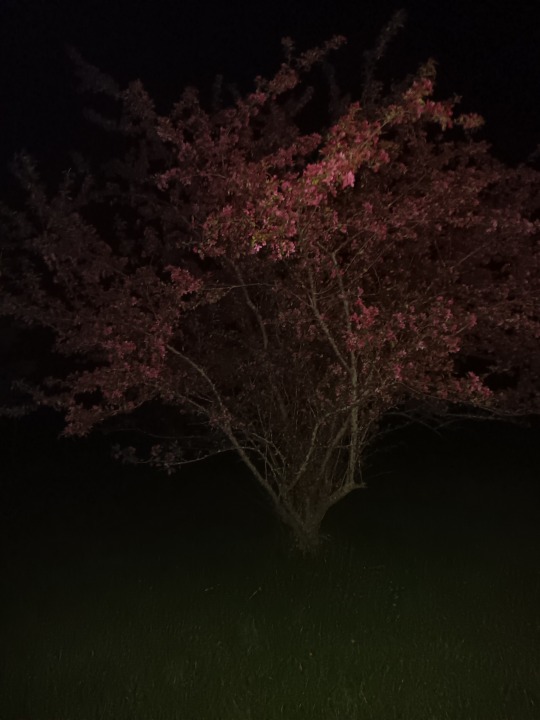
1 note
·
View note
Text
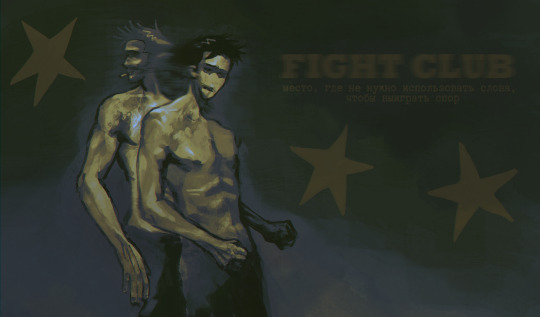
Fight Club.
A place where you don't have to use words to win an argument.
466 notes
·
View notes
Text
btw when you guys refer to middle eastern things with "arab" or "muslim" just know non-muslim and non-arab middle easterners are sitting there doing this at you
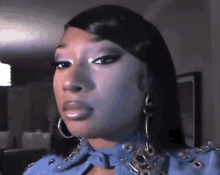
525 notes
·
View notes
Photo

‘Dismantle Prisons, Abolish ICE’
Poster designed by Art Twink
48K notes
·
View notes
Text
(Guy whos never been at risk from systemic violence voice) No i think all violence is bad guys. You know. The cycle of violence. I think both sides are bad!
31K notes
·
View notes
Note
When you tag things “#abolition”, what are you referring to? Abolishing what?
Prisons, generally. Though not just physical walls of formal prisons, but also captivity, carcerality, and carceral thinking. Including migrant detention; national border fences; indentured servitude; inability to move due to, and labor coerced through, debt; de facto imprisonment or isolation of the disabled or medically pathologized; privatization and enclosure of land; categories of “criminality"; etc.
In favor of other, better lives and futures.
Specifically, I am grateful to have learned from the work of these people:
Ruth Wilson Gilmore on “abolition geography”.
Katherine McKittrick on "imaginative geographies"; emotional engagement with place/landscape; legacy of imperialism/slavery in conceptions of physical space and in devaluation of other-than-human lifeforms; escaping enclosure; plantation “afterlives” and how plantation logics continue to thrive in contemporary structures/institutions like cities, prisons, etc.; a “range of rebellions” through collaborative acts, refusal of the dominant order, and subversion through joy and autonomy.
Macarena Gomez-Barris on landscapes as “sacrifice zones”; people condemned to live in resource extraction colonies deemed as acceptable losses; place-making and ecological consciousness; and how “the enclosure, the plantation, the ship, and the prison” are analogous spaces of captivity.
Liat Ben-Moshe on disability; informal institutionalization and incarceration of disabled people through physical limitation, social ostracization, denial of aid, and institutional disavowal; and "letting go of hegemonic knowledge of crime”.
Achille Mbembe on co-existence and care; respect for other-than-human lifeforms; "necropolitics" and bare life/death; African cosmologies; historical evolution of chattel slavery into contemporary institutions through control over food, space, and definitions of life/land; the “explicit kinship between plantation slavery, colonial predation, and contemporary resource extraction” and modern institutions.
Robin Maynard on "generative refusal"; solidarity; shared experiences among homeless, incarcerated, disabled, Indigenous, Black communities; to "build community with" those who you are told to disregard in order "to re-imagine" worlds; envisioning, imagining, and then manifesting those alternative futures which are "already" here and alive.
Leniqueca Welcome on Caribbean world-making; "the apocalyptic temporality" of environmental disasters and the colonial denial of possible "revolutionary futures"; limits of reformism; "infrastructures of liberation at the end of the world."; "abolition is a practice oriented toward the full realization of decolonization, postnationalism, decarceration, and environmental sustainability."
Stefano Harney and Fred Moten on “the undercommons”; fugitivity; dis-order in academia and institutions; and sharing of knowledge.
AM Kanngieser on "deep listening"; “refusal as pedagogy”; and “attunement and attentiveness” in the face of “incomprehensible” and immense “loss of people and ecologies to capitalist brutalities”.
Lisa Lowe on "the intimacies of four continents" and how British politicians and planters feared that official legal abolition of chattel slavery would endanger Caribbean plantation profits, so they devised ways to import South Asian and East Asian laborers.
Ariella Aisha Azoulay on “rehearsals with others’.
Phil Neel on p0lice departments purposely targeting the poor as a way to raise municipal funds; the "suburbanization of poverty" especially in the Great Lakes region; the rise of lucrative "logistics empires" (warehousing, online order delivery, tech industries) at the edges of major urban agglomerations in "progressive" cities like Seattle dependent on "archipelagos" of poverty; and the relationship between job loss, homelessness, gentrification, and these logistics cities.
Alison Mountz on migrant detention; "carceral archipelagoes"; and the “death of asylum”.
Pedro Neves Marques on “one planet with many worlds inside it”; “parallel futures” of Indigenous, Black, disenfranchised communities/cosmologies; and how imperial/nationalist institutions try to foreclose or prevent other possible futures by purposely obscuring or destroying histories, cosmologies, etc.
Peter Redfield on the early twentieth-century French penal colony in tropical Guiana/Guyana; the prison's invocation of racist civilization/savagery mythologies; and its effects on locals.
Iain Chambers on racism of borders; obscured and/or forgotten lives of migrants; and disrupting modernity.
Paulo Tavares on colonial architecture; nationalist myth-making; and erasure of histories of Indigenous dispossession.
Elizabeth Povinelli on "geontopower"; imperial control over "life and death"; how imperial/nationalist formalization of private landownership and commodities relies on rigid definitions of dynamic ecosystems.
Kodwo Eshun on African cosmologies and futures; “the colonial present”; and imperialist/nationalist use of “preemptive” and “predictive” power to control the official storytelling/narrative of history and to destroy alternatives.
Tim Edensor on urban "ghosts" and “industrial ruins”; searching for the “gaps” and “silences” in the official narratives of nations/institutions, to pay attention to the histories, voices, lives obscured in formal accounts.
Megan Ybarra on place-making; "site fights"; solidarity and defiance of migrant detention; and geography of abolition/incarceration.
Sophie Sapp Moore on resistance, marronage, and "forms of counterplantation life"; "plantation worlds" which continue to live in contemporary industrial resource extraction and dispossession.
Deborah Cowen on “infrastructures of empire and resistance”; imperial/nationalist control of place/space; spaces of criminality and "making a life at the edge" of the law; “fugitive infrastructures”.
Elizabeth DeLoughrey on indentured labor; the role of plants, food, and botany in enslaved and fugitive communities; the nineteenth-century British Empire's labor in the South Pacific and Caribbean; the twentieth-century United States mistreatment of the South Pacific; and the role of tropical islands as "laboratories" and isolated open-air prisons for Britain and the US.
Dixa Ramirez D’Oleo on “remaining open to the gifts of the nonhuman” ecosystems; hinterlands and peripheries of empires; attentiveness to hidden landscapes/histories; defying surveillance; and building a world of mutually-flourishing companions.
Leanne Betasamosake Simpson on reciprocity; Indigenous pedagogy; abolitionism in Canada; camaraderie; solidarity; and “life-affirming” environmental relationships.
Anand Yang on "forgotten histories of Indian convicts in colonial Southeast Asia" and how the British Empire deported South Asian political prisoners to the region to simultaneously separate activists from their communities while forcing them into labor.
Sylvia Wynter on the “plot”; resisting the plantation; "plantation archipelagos"; and the “revolutionary demand for happiness”.
Pelin Tan on “exiled foods”; food sovereignty; building affirmative care networks in the face of detention, forced migration, and exile; connections between military rule, surveillance, industrial monocrop agriculture, and resource extraction; the “entanglement of solidarity” and ethics of feeding each other.
Avery Gordon on haunting; spectrality; the “death sentence” of being deemed “social waste” and being considered someone “without future”; "refusing" to participate; "escaping hell" and “living apart” by striking, squatting, resisting; cultivating "the many-headed hydra of the revolutionary Black Atlantic"; alternative, utopian, subjugated worldviews; despite attempts to destroy these futures, manifesting these better worlds, imagining them as "already here, alive, present."
Jasbir Puar on disability; debilitation; how the control of fences, borders, movement, and time management constitute conditions of de facto imprisonment; institutional control of illness/health as a weapon to "debilitate" people; how debt and chronic illness doom us to a “slow death”.
Kanwal Hameed and Katie Natanel on "liberation pedagogy"; sharing of knowledge, education, subversion of colonial legacy in universities; "anticolonial feminisms"; and “spaces of solidarity, revolt, retreat, and release”.
2K notes
·
View notes
Text
Hello! My name is Jericho, I am a intersex transsexual person who relies on my hormones to maintain both my physical and mental well-being! Recently, my insurance has denied my pre-authorization, and it has been a 3 month battle and 3 months without my proper medication which had lost me employment, and while I am finally getting an appeal sent, it can take up to 30 days to hear anything back, and my health has been getting progressively worse. I am biting the bullet and deciding to pay for my medication out of pocket as I can not go much longer without it- but I do not have the income to buy my hormones out of pocket, which is why I am making this post, even if you can't donate it would be a life saver.
0/200
p*yp*l: ericillouz
c*sha*p: ultraej
159 notes
·
View notes
